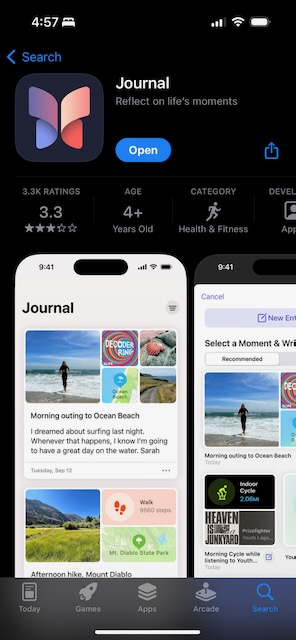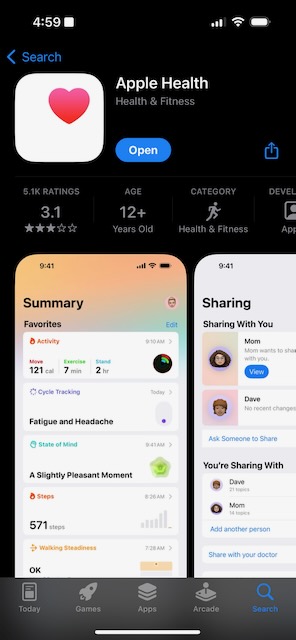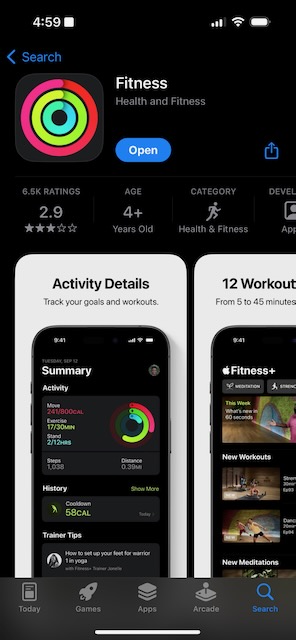Apple Journal
Last year I was lucky enough to attend WWDC for the first time. I really enjoyed the opportunity to see Apple's Infinite Loop campus. It's absolutely stunning.
One of the rumored announcements leading up to the event was the Apple Journal. I was excited when I first heard news that they were going to be announcing a journalling app at WWDC23. Over the years, I've found Day One to be a fantastic app for journaling, but I really wanted to see a fundamentally different way of linking to content from my journal.
Most content, like photos and videos, are obviously copied when imported into Day One. That seemed like a potential waste of storage to me. I don't really want or need multiple copies of the content I'm writing about. What I thought made more sense, was a simple link between the journal entry and the content. Similar to the way an <img> tag works in a web browser. The HTML doesn't contain the image, but instead the browser fetches the images (likely from a CDN) when rendered. An added benefit of linking is the ability to indicate in another app (take photos for example) that a journal entry exists for a specific piece of content, and allow the user to jump right to that entry.
Naturally, when I heard Apple had been working on a Journaling app, I knew they had to be working on an interesting way of including or linking to content already on my iPhone. I was excited to see what they came up with.
When Apple announced Journal at WWDC I was delighted to see the specifics of how it worked. The ability to start an entry from all sorts of data already on your iPhone, from phone calls with friends and family, trips to new places, workouts, and photos, there was so much more content than I had imagined. I was both surprised, and disappointed, that no one clapped after this segment of the keynote. While a journaling app is nothing new, I thought the framework and foundation they showcased was really compelling. While I'm sure the app is still making copies of most content, the potential for deep linking to content already on the phone seems much more likely now.
After the announcement, I patiently waited months for the new app to show up in an OS release. Six months after it was announced, I finally got to try it first-hand.
It took some time before there were any relevant entry suggestions to pick from, but once the data was available, I found that it did make it easy to start an entry about something I was already interested in writing about. Whether it was a phone call with a friend I hadn't talked to in a while, a trip to a new restaurant, or photos of my son, I found Journaling to be a little more effortless and fun (minus the lack of a physical keyboard of course).
The app is missing many of the features that make Day One such a great journaling app. And while I certainly don't expect Apple to include the same capabilities in future versions, there are some must-haves for it to be more widely adopted. Things like support for iPad and Mac, search, calendar/grid views, and rich-text/formatting, to name a few.
If Apple continues to develop Journal into its full potential, I believe it has the potential to be something that is cherished by many users. I do worry a little that the negative feedback and the current disinterest of so many potential users may stifle further development, but I can't think of any apps Apple has released that they no longer support. I can think of features (like the social network they tried to create within iTunes, called iTunes Ping), but I can't think of an entire app that they've killed (thankfully). I hope this precedent remains true.
When I wrote this, I decided to check out the current ratings in the App Store. While I was not surprised by the 3.3 average, I was a bit surprised by the number of reviews, 3,300. I was also surprised to find that it's on-par with some of Apple's other more recent apps, such as Health (3.1 stars and 5,100 ratings) and Fitness (2.9 stars and 6,500 ratings).



All three of these apps are relatively complex. They're dealing with data across multiple devices/sensors, have developer frameworks for interacting with the data they store, and probably most important, they naturally inspire a wide range of desired features and capabilities. I can only imagine how difficult it would be to develop these in a way that works for the vast majority of users.
I will continue to use Journal for now and I'm looking forward to what Apple has in store for the next release.

